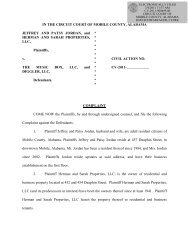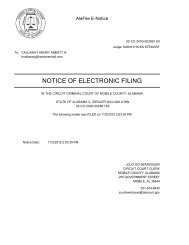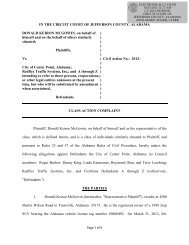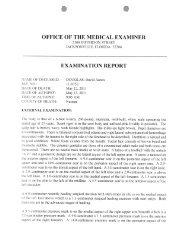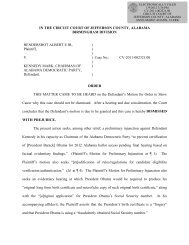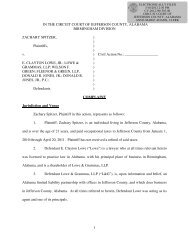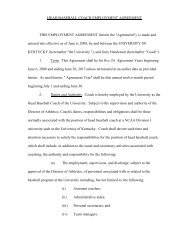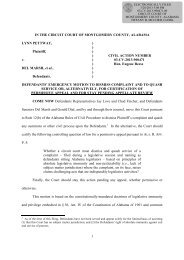Sentenced to Stigma: Segregation of HIV-Positive Prisoners - AL.com
Sentenced to Stigma: Segregation of HIV-Positive Prisoners - AL.com
Sentenced to Stigma: Segregation of HIV-Positive Prisoners - AL.com
You also want an ePaper? Increase the reach of your titles
YUMPU automatically turns print PDFs into web optimized ePapers that Google loves.
Today, only three states place all <strong>HIV</strong>-positive prisoners in<strong>to</strong> separate, specially designatedhousing units: Alabama, South Carolina and Mississippi, with the policy in Mississippi <strong>to</strong> bephased out. In each <strong>of</strong> these states, controversy and litigation have surrounded prison<strong>of</strong>ficials’ response <strong>to</strong> <strong>HIV</strong>. In 1987, the ACLU challenged Alabama’s segregation policy for<strong>HIV</strong>-positive prisoners on constitutional grounds as well as under the federal RehabilitationAct. The 11 th Circuit Court <strong>of</strong> Appeals decided that the segregation policy did not violate theprisoners’ constitutional rights <strong>to</strong> privacy and confidentiality as it was reasonably related <strong>to</strong>the legitimate correctional goal <strong>of</strong> preventing the spread <strong>of</strong> disease. The Rehabilitation Actclaims were sent back <strong>to</strong> the trial court for further proceedings but ultimately dismissed bythe 11 th Circuit en banc. 21 In 2004, the Southern Center for Human Rights challenged theadequacy <strong>of</strong> medical care for <strong>HIV</strong> on behalf <strong>of</strong> prisoners at Limes<strong>to</strong>ne Correctional Facility inHarvest, Alabama. The case was settled in 2004, but <strong>com</strong>pliance issues persistedthroughout the two year period <strong>of</strong> the settlement agreement. 22 Gradually, as a result <strong>of</strong> legalaction and intense advocacy efforts by the ACLU and other <strong>com</strong>munity leaders, access <strong>to</strong>programs, jobs, and activities has improved significantly for prisoners living with <strong>HIV</strong> inAlabama. For example, in July 2009 a new corrections administration in Alabama changedthe work release policy <strong>to</strong> permit the participation <strong>of</strong> <strong>HIV</strong>-positive prisoners.In Mississippi, the ACLU pursued both litigation and advocacy <strong>to</strong> address medical care,conditions <strong>of</strong> confinement, and opportunities for programs for <strong>HIV</strong>-positive prisoners. 23 In1999, the ACLU-NPP won an injunction requiring the Mississippi Department <strong>of</strong> Corrections<strong>to</strong> provide all <strong>HIV</strong>-positive prisoners with medical treatment consistent with federalguidelines. 24 In 2000-2001, at the urging <strong>of</strong> the ACLU and a coalition <strong>of</strong> state legisla<strong>to</strong>rs,prisoners’ family members and local advocates, the Commissioner <strong>of</strong> the MississippiDepartment <strong>of</strong> Corrections convened a task force <strong>to</strong> study <strong>HIV</strong>-positive prisoners’ access <strong>to</strong>programs, appointing the ACLU <strong>to</strong> serve along with <strong>of</strong>ficials from MDOC and the Mississippipublic health department. In May 2001, the Commissioner, adopting the Task Force’sre<strong>com</strong>mendations, ordered that all in-prison programs other than food service jobs be21 Harris v. Thigpen, 941 F2d 1495 (11thCir. 1991), later Onishea v. Hopper, 171 F.3d 1289 (11 th Cir. 1999), cert. denied, 528 U.S.1114 (2000). Plaintiffs’ attempt <strong>to</strong> add claims under the Americans with Disabilities Act was dismissed by the trial court afterremand.22 Leatherwood v. Campbell, CV-02-BE-2812-W, U.S. District Court, Northern District <strong>of</strong> Alabama (2004) . For a <strong>com</strong>prehensiveaccount <strong>of</strong> efforts <strong>to</strong> obtain adequate medical care in the <strong>HIV</strong> unit at Limes<strong>to</strong>ne, see B. Fleury-Steiner and C. Crowder, DyingInside: the <strong>HIV</strong>/AIDS Ward at Limes<strong>to</strong>ne Prison, (University <strong>of</strong> Michigan Press: Ann Arbor, 2008).23 Gates v. Collier, 4:71cv6, consolidated with Moore v. Fordice, 4:90cv-125. Prospective relief in Moore was terminated in2005 pursuant <strong>to</strong> the Prison Litigation Reform Act (PLRA), based on the district court’s finding that constitutional violationswithin the purview <strong>of</strong> the case had been remedied. Portions <strong>of</strong> Gates, relating <strong>to</strong> conditions at Mississippi State Penitentiary,Unit 32 (Mississippi’s death row and super-maximum security facility) are ongoing; on November 18, 2009, the State moved <strong>to</strong>terminate under the PLRA.24 Moore v. Fordice, 4:90cv-125, (N.D. Miss. July 19, 1999)<strong>Sentenced</strong> <strong>to</strong> <strong>Stigma</strong> 14



